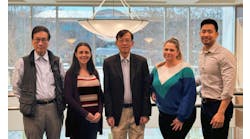Transitions, a program of San Diego-based Sharp HealthCare, won the 2019 Hearst Health Prize at the Population Health Colloquium in Philadelphia on March 19.
This annual award is given by Hearst Health, a division of Hearst, and the Jefferson College of Population Health at Thomas Jefferson University in recognition of outstanding achievement in managing or improving health in the United States. The winner is awarded $100,000 and two finalists each receive $25,000. Gregory Dorn, M.D., M.P.H., president of Hearst Health, and David B. Nash, M.D., M.B.A., dean of the Jefferson College of Population Health, announced the prizes and congratulated the winners.
Sharp’s Transitions designed a program to provide home-based palliative care for patients with advanced and progressive chronic illnesses using a disease-specific prognostic model. Transitions addresses the needs of the pre-terminal population upstream before they use the hospital to manage predictable decompensations of their disease. The palliative care team includes doctors, nurses, spiritual care providers and social workers. Care is personalized to address each patient’s unique physical, emotional and spiritual needs, while also providing support to patients’ families and caregivers.
Sharp has found that emergency room visits and hospitalizations decreased from 85 percent in usual care to 35 percent in the new model for cancer patients. It has seen a decrease in hospital mortality from 57 percent to 5 percent for cancer patients. It also has led to significantly reduced per-patient costs for cancer, COPD, heart failure and dementia.
In accepting the award, Suzi Johnson, M.P.H., R.N., vice president of Sharp HospiceCare, said among the keys to the program’s success were the evidence-based prognostication and bringing care to the home. “It offers caregiver support and goals-of-care conversations. The difference three months prior to death among our patients is remarkable,” she said. “They have a higher level of satisfaction, higher rates of hospice utilization, and improved quality of life. Impacting quality for the family is a big win for us. The fundamental construct works. We can allow people to stay in their own home safely for the last couple years of life. It is a humanistic way to take care of people. Let’s do it.”
One of the runner-up winners is Arkansas SAVES (Stroke Assistance through Virtual Emergency Support), a program administered by University of Arkansas for Medical Sciences (UAMS) in partnership with the state’s Medicaid agency. Targeting people experiencing stroke symptoms throughout the state, its emphasis is on delivery of stroke care to rural, medically underserved populations (approximately 44 percent of the state’s population lives in rural areas). Arkansas SAVES extends real-time, interactive neurological consultation to patients. Some of the impacts of the program include:
• Over 2,000 Arkansas SAVES patients have been treated with alteplase; prior to this program fewer than 1 percent of Arkansas’ stroke victims were receiving this life-saving medication. The treatment rate for 2017 was over 34 percent among SAVES patients.
• SAVES averages 68 minutes for door-to-needle, 20 minutes faster than the national average.
• In 2017, at three months, nearly 70 percent of patients made a full recovery or recovery with slight issues from stroke.
• Over 80 percent of Arkansans are now within a 30-minute drive of a SAVES site, and 99 percent of Arkansans are within a 60-minute drive, a dramatic increase from 38 percent in 2009.
The other runner-up winner is a program called the Mental health Outreach for MotherS (MOMS) Partnership, developed by the Yale School of Medicine, in collaboration with community agencies and families. Launched in New Haven, Conn., in 2011 the MOMS Partnership program uses multiple interventions to strengthen the mental health of overburdened and under-resourced mothers and help interrupt intergenerational poverty. The impact includes:
• 78 percent of MOMS participants completed the program compared to a national average of 30 percent for a similar population.
• Three of four participants experienced a decrease in depressive symptoms from beginning to end of the full MOMS program. Participants have a 67 percent decrease in parenting stress from beginning to end of the program—vs. 30 percent who access only components. Of those experiencing a decrease, the average participant experienced a 48 percent drop in depressive symptoms.
• The percentage of women working at least 15 hours a week increased after from 15 percent at time of enrollment to 39 percent at six months after graduating from MOMS.

